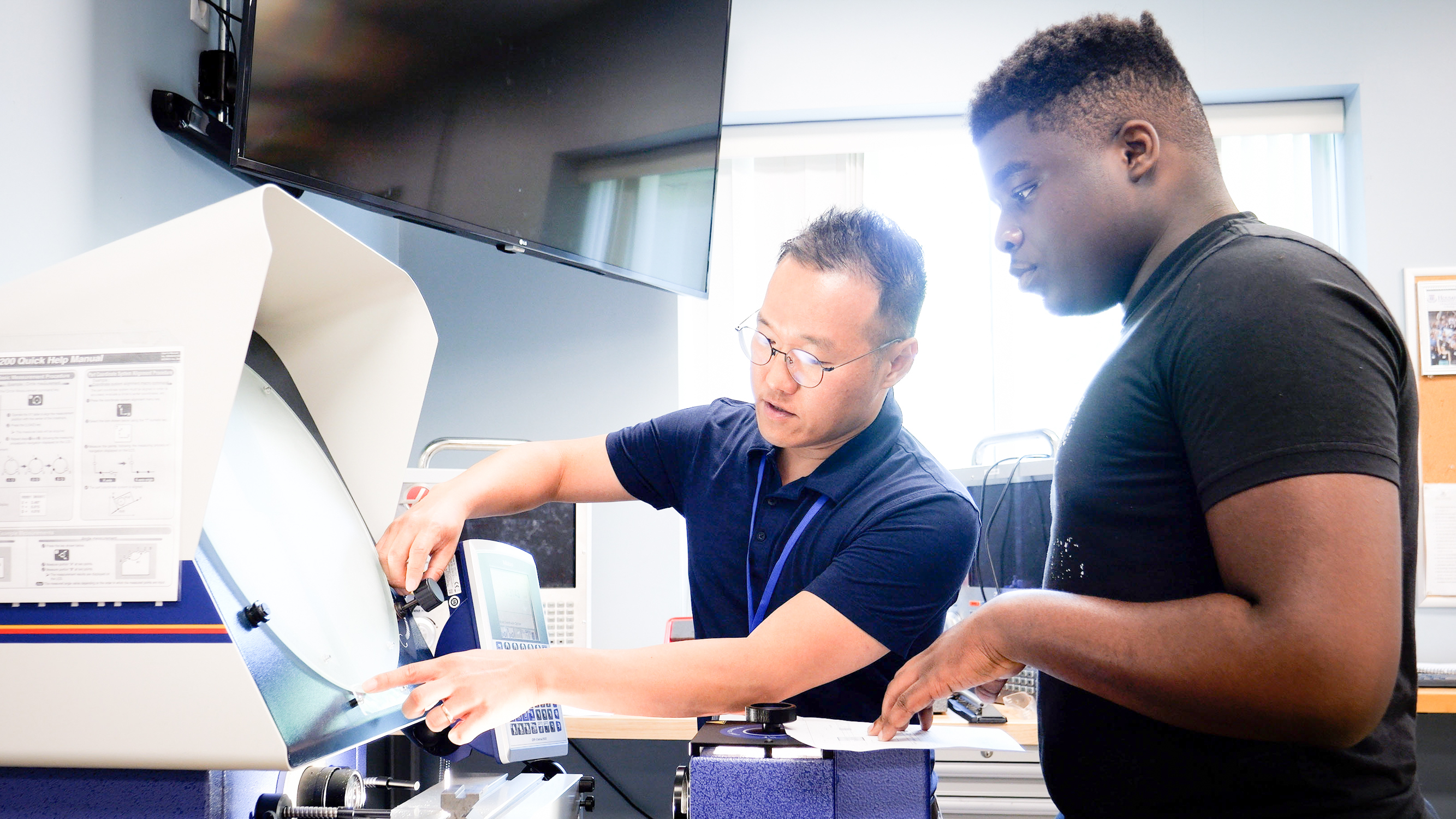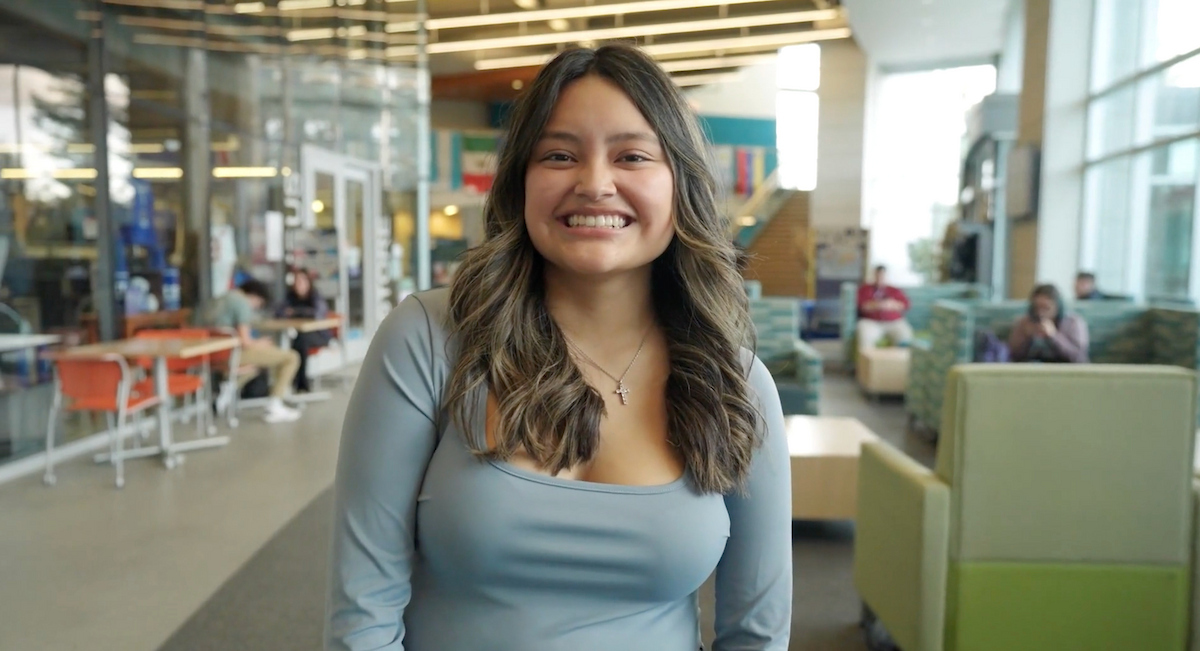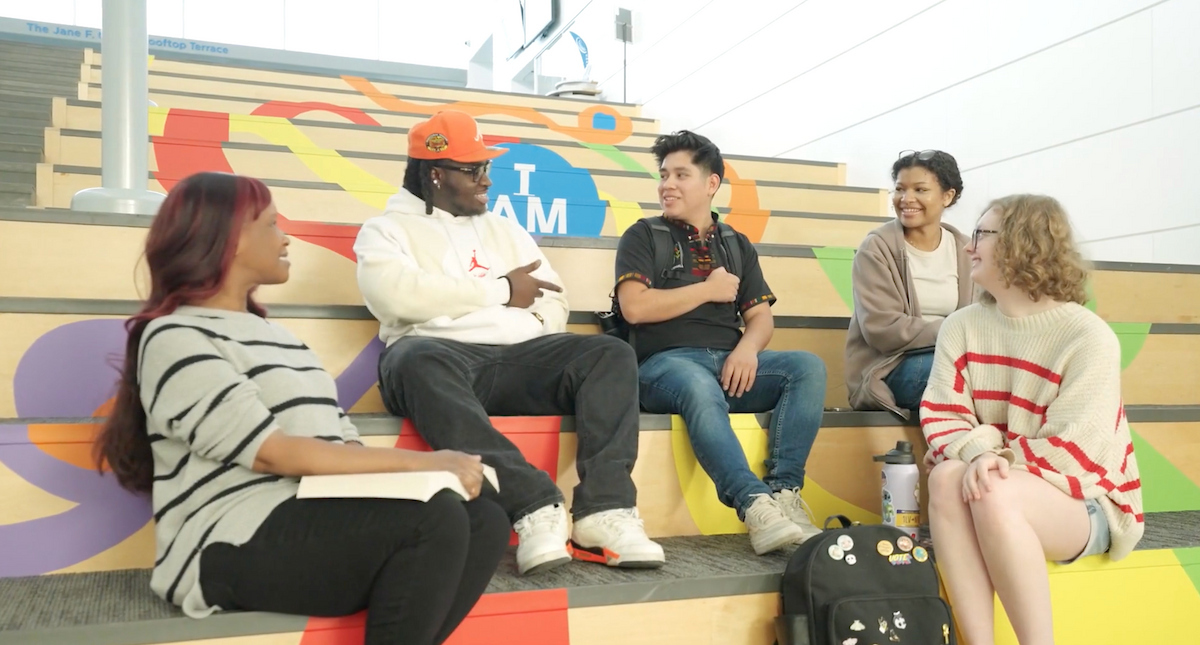The College of Technology (COT) provides career pathways for students to earn certificates, Associate of Science and Bachelor of Science degrees in Engineering and Technology disciplines. COT reduces barriers to education by providing a seamless articulation between CT State and the four-year partner universities and offering multiple points of entry for completion of degrees.
Programs
See Pathways for details on transfer between CT State COT programs and four-year partner universities.

History
The COT was established in 1992 under Connecticut Public Act 92-126 to form articulation agreements between all twelve Connecticut community colleges and public and private partner universities. This unique infrastructure and governance provide seamless articulation between the community colleges and their four-year partner universities, providing multiple points of entry for degree completion. For over 30 years, the COT has provided leadership for transfer pathways and has been recognized as a model transfer program.
Leadership Structure
The COT is led by a State Director and a Site Coordinator's Council, which meets monthly, includes representatives from 4-year public and private university partners, all campuses of CT State Community College, as well as the Connecticut Technical High School System, and business and industry partners.
See Current COT Leadership
Pathways
Start at CT State → Finish at a 4-year institution.
The credits from College of Technology degrees are transferable to various four-year programs. Search the table below to learn more.
| Image |
Bachelor Degree |
Transfer College/University |
CT State Degree |
Learn More |
|
|
Text 6 |
Text 7 |
Text 8 |
Text 9 |
Text 10 |
Text 11 |
Text 12 |
Text 13 |
Text 14 |
Text 15 |
Text 16 |
Text 17 |
Text 18 |
Text 19 |
Text 20 |
Link |
|
|
Acoustical Engineering and Music, BSE |
University of Hartford |
Engineering Science, AS
|
|
Apply/Transfer |
Program Sheet |
|
|
|
|
|
|
|
|
|
|
|
|
|
|
|
|
|
|
Aerospace Engineering, BSAE |
University of Hartford |
Engineering Science, AS
|
|
Apply/Transfer |
Program Sheet |
|
|
|
|
|
|
|
|
|
|
|
|
|
|
|
|
|
|
Biomedical Engineering, BS |
Fairfield University |
Engineering Science, AS
|
|
Apply/Transfer |
Program Sheet |
|
|
|
|
|
|
|
|
|
|
|
|
|
|
|
|
|
|
Biomedical Engineering, BSBE |
University of Hartford |
Engineering Science, AS
|
|
Apply/Transfer |
Program Sheet |
|
|
|
|
|
|
|
|
|
|
|
|
|
|
|
|
|
|
Biomedical Engineering, BSE |
University of Connecticut |
Engineering Science, AS |
|
Apply/Transfer |
Program Sheet |
|
|
|
|
|
|
|
|
|
|
|
|
|
|
|
|
|
|
Chemical and Biomolecular Engineering, BS |
University of New Haven |
Engineering Science, AS
|
|
Apply/Transfer |
Program Sheet |
|
|
|
|
|
|
|
|
|
|
|
|
|
|
|
|
|
|
Chemical Engineering, BSE |
University of Connecticut |
Engineering Science, AS |
|
Apply/Transfer |
Program Sheet |
|
|
|
|
|
|
|
|
|
|
|
|
|
|
|
|
|
|
Civil Engineering, BS |
Central CT State University |
Engineering Science, AS |
|
Apply/Transfer |
Program Sheet |
|
|
|
|
|
|
|
|
|
|
|
|
|
|
|
|
|
|
Civil Engineering, BS |
University of New Haven |
Engineering Science, AS
|
|
Apply/Transfer |
Program Sheet |
|
|
|
|
|
|
|
|
|
|
|
|
|
|
|
|
|
|
Civil Engineering, BSCE |
University of Hartford |
Engineering Science, AS
|
|
Apply/Transfer |
Program Sheet |
|
|
|
|
|
|
|
|
|
|
|
|
|
|
|
|
|
|
Civil Engineering, BSE |
University of Connecticut |
Engineering Science, AS |
|
Apply/Transfer |
Program Sheet |
|
|
|
|
|
|
|
|
|
|
|
|
|
|
|
|
|
|
Computer Engineering, BS |
Sacred Heart University |
Engineering Science, AS
|
|
Apply/Transfer |
Program Sheet |
|
|
|
|
|
|
|
|
|
|
|
|
|
|
|
|
|
|
Computer Engineering, BS |
University of Bridgeport |
Engineering Science, AS
|
|
Apply/Transfer |
Program Sheet |
|
|
|
|
|
|
|
|
|
|
|
|
|
|
|
|
|
|
Computer Engineering, BSCmpE |
University of Hartford |
Engineering Science, AS
|
|
Apply/Transfer |
Program Sheet |
|
|
|
|
|
|
|
|
|
|
|
|
|
|
|
|
|
|
Computer Engineering Technology, BS |
University of Bridgeport |
Engineering Science, AS
|
|
Apply/Transfer |
Program Sheet |
|
|
|
|
|
|
|
|
|
|
|
|
|
|
|
|
|
|
Computer Engineering Technology, BS |
University of Bridgeport |
Technology Studies, AS |
|
Apply/Transfer |
Program Sheet |
|
|
|
|
|
|
|
|
|
|
|
|
|
|
|
|
|
|
Computer Science, BS |
University of Bridgeport |
Engineering Science, AS
|
|
Apply/Transfer |
Program Sheet |
|
|
|
|
|
|
|
|
|
|
|
|
|
|
|
|
|
|
Electrical and Computer Engineering, BS |
University of New Haven |
Engineering Science, AS
|
|
Apply/Transfer |
Program Sheet |
|
|
|
|
|
|
|
|
|
|
|
|
|
|
|
|
|
|
Electrical Engineering, BS |
Central CT State University |
Engineering Science, AS
|
|
Apply/Transfer |
Program Sheet |
|
|
|
|
|
|
|
|
|
|
|
|
|
|
|
|
|
|
Electrical Engineering, BS |
Fairfield University |
Engineering Science, AS
|
|
Apply/Transfer |
Program Sheet |
|
|
|
|
|
|
|
|
|
|
|
|
|
|
|
|
|
|
Electrical Engineering, BS |
Sacred Heart University |
Engineering Science, AS
|
|
Apply/Transfer |
Program Sheet |
|
|
|
|
|
|
|
|
|
|
|
|
|
|
|
|
|
|
Electrical Engineering, BS |
University of Bridgeport |
Engineering Science, AS
|
|
Apply/Transfer |
Program Sheet |
|
|
|
|
|
|
|
|
|
|
|
|
|
|
|
|
|
|
Electrical Engineering, BSE |
University of Connecticut |
Engineering Science, AS |
|
Apply/Transfer |
Program Sheet |
|
|
|
|
|
|
|
|
|
|
|
|
|
|
|
|
|
|
Engineering, BS |
University of New Haven |
Engineering Science, AS
|
|
Apply/Transfer |
Program Sheet |
|
|
|
|
|
|
|
|
|
|
|
|
|
|
|
|
|
|
Environmental Engineering, BSE |
University of Connecticut |
Engineering Science, AS |
|
Apply/Transfer |
Program Sheet |
|
|
|
|
|
|
|
|
|
|
|
|
|
|
|
|
|
|
Electrical Engineering, BSEE |
University of Hartford |
Engineering Science, AS
|
|
Apply/Transfer |
Program Sheet |
|
|
|
|
|
|
|
|
|
|
|
|
|
|
|
|
|
|
Manufacturing Engineering Technology, BS |
Central CT State University |
Engineering Science, AS
|
|
Apply/Transfer |
Program Sheet |
|
|
|
|
|
|
|
|
|
|
|
|
|
|
|
|
|
|
Manufacturing Management, BS |
Central CT State University |
Engineering Science, AS
|
|
Apply/Transfer |
Program Sheet |
|
|
|
|
|
|
|
|
|
|
|
|
|
|
|
|
|
|
Mechanical Engineering Technology, BS |
Central CT State University |
Engineering Science, AS
|
|
Apply/Transfer |
Program Sheet |
|
|
|
|
|
|
|
|
|
|
|
|
|
|
|
|
|
|
Mechanical Engineering, BS |
Central CT State University |
Engineering Science, AS
|
|
Apply/Transfer |
Program Sheet |
|
|
|
|
|
|
|
|
|
|
|
|
|
|
|
|
|
|
Mechanical Engineering, BS |
Fairfield University |
Engineering Science, AS
|
|
Apply/Transfer |
Program Sheet |
|
|
|
|
|
|
|
|
|
|
|
|
|
|
|
|
|
|
Mechanical Engineering, BS |
University of Bridgeport |
Engineering Science, AS
|
|
Apply/Transfer |
Program Sheet |
|
|
|
|
|
|
|
|
|
|
|
|
|
|
|
|
|
|
Mechanical Engineering, BS |
University of New Haven |
Engineering Science, AS
|
|
Apply/Transfer |
Program Sheet |
|
|
|
|
|
|
|
|
|
|
|
|
|
|
|
|
|
|
Mechanical Engineering, BSE |
University of Connecticut |
Engineering Science, AS |
|
Apply/Transfer |
Program Sheet |
|
|
|
|
|
|
|
|
|
|
|
|
|
|
|
|
|
|
Mechanical Engineering, BSME |
University of Hartford |
Engineering Science, AS
|
|
Apply/Transfer |
Program Sheet |
|
|
|
|
|
|
|
|
|
|
|
|
|
|
|
|
|
|
Physics, BS-Engineering |
Southern Connecticut State University |
Engineering Science, AS
|
|
Apply/Transfer |
Program Sheet |
|
|
|
|
|
|
|
|
|
|
|
|
|
|
|
|
|
|
Robotics and Mechatronics Engineering Technology, BS |
Central CT State University |
Engineering Science, AS
|
|
Apply/Transfer |
Program Sheet |
|
|
|
|
|
|
|
|
|
|
|
|
|
|
|
|
|
|
Robotics Engineering, BSE |
University of Connecticut |
Engineering Science, AS
|
|
Apply/Transfer |
Program Sheet |
|
|
|
|
|
|
|
|
|
|
|
|
|
|
|
|
|
|
Robotics Engineering, BSRE |
University of Hartford |
Engineering Science, AS
|
|
Apply/Transfer |
Program Sheet |
|
|
|
|
|
|
|
|
|
|
|
|
|
|
|
|
|
|
Technology Management, BS |
Central CT State University |
Engineering Science, AS
|
|
Apply/Transfer |
Program Sheet |
|
|
|
|
|
|
|
|
|
|
|
|
|
|
|
|
|
|
Technology Management, BS |
Central CT State University |
Technology Studies, AS |
|
Apply/Transfer |
Program Sheet |
|
|
|
|
|
|
|
|
|
|
|
|
|
|
|
|
Leadership
Director of the College of Technology
Community College Coordinators
Mary Bidwell, Director, Advanced Manufacturing Technology
Campus: Asnuntuck
Email: mary.bidwell@ctstate.edu
Andre Freeman, Professor, Mathematics
Campus: Capital
Email: andre.freeman@ctstate.edu
Susan Spencer, Professor and PC, Math/Science
Campus: Gateway
Email: susan.spencer@ctstate.edu
Stella Litwinowicz, Professor, Engineering and Math
Campus: Housatonic
Email: stella.litwinowicz@ctstate.edu
Mehrdad Faezi, Professor, Manufacturing Engineering Technology
Campus: Manchester
Email: mehrdad.faezi@ctstate.edu
Lin Lin, Professor and PC, Engineering, Computer Science and Technology
Campus: Middlesex
Email: lin.lin@ctstate.edu
Kristen Dagan, Department. Chair, Engineering and Technology
Campus: Naugatuck Valley
Email: kristen.dagan@ctstate.edu
John Jagtiani, Professor, Business Intelligence/Information Systems, STEM
Campus: Northwestern
Email: john.jagtiani@ctstate.edu
Mobin Rastgar Agah, Professor and PC, Engineering
Campus: Norwalk
Email: mobin.rastgaragah@ctstate.edu
Jakob Spjut, Department Chair, Engineering and Technology
Campus: Quinebaug Valley
Email: jakob.spjut@ctstate.edu
Diba Khan-Bureau, Professor, Civil/Environmental Engineering Technology
Campus: Three Rivers
Email: diba.khanbureau@ctstate.edu
Four-Year Institution Coordinators
David Ferreira, Provost
Institution: Charter Oak State College,
Ravindra Thamma, Associate Dean, School of Science, Engineering and Technology
Institution: Central CT State University
Email: thammarav@ccsu.edu
Harvey Hoffman, Assistant Dean, School of Engineering
Institution: Fairfield University
Email: hhoffman@fairfield.edu
Daniel Burkey, Assistant Dean, School of Engineering,
Institution: University of Connecticut
Email: daniel.burkey@uconn.edu
Laurie Granstrand, Enrollment Manager
Institution: University of Hartford
Email: granstran@hartford.edu
Joyce Hu, Program Coordinator, Mechanical Engineering
Institution: University of Bridgeport
Email: jjhu@bridgeport.edu
Stephanie Gillespie, Associate Dean, School of Engineering
Institution: University of New Haven
Email: sgillespie@newhaven.edu
Matthew Enjarlan, Department Chair
Institution: Southern CT State University
Email: enjalranm1@southernct.edu
Secondary School Coordinators
 [bootstrap-filled--people]
[bootstrap-filled--people]


